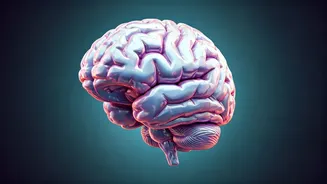Embrace New Skills
Learning new skills serves as a fantastic mental workout, improving brain function. Studies show that continuously challenging your brain with new information
and activities can enhance cognitive abilities significantly. Dr. Chadha points out that incorporating continuous learning into your routine is essential. This can involve anything from picking up a new language or musical instrument, to exploring a new hobby. The more you engage your brain in new learning experiences, the better it becomes at processing and retaining information. Furthermore, this practice helps build resilience against age-related cognitive decline, keeping your mind sharp and agile for years to come. In essence, dedicating time to learn new skills should be a constant element to improve your brain health.
Prioritize Strong Connections
Building and maintaining strong social connections is vital for brain health. Engaging in meaningful relationships stimulates the brain in numerous ways, leading to better cognitive function. A strong social network reduces stress and promotes emotional well-being, both of which are crucial for brain health. This can be achieved through regular social interactions with friends, family, and colleagues. Participating in group activities, community events, or simply spending quality time with loved ones also helps. These social interactions create a sense of belonging and provide mental stimulation. Dr. Chadha emphasizes the importance of making social interaction a priority to promote better cognitive health and memory retention. Cultivating these relationships boosts your overall mental health.
Avoid Processed Foods
The food you consume has a direct impact on your brain health. Avoiding processed and sugary foods is a key recommendation. These types of foods often lack essential nutrients and can lead to inflammation and oxidative stress, both of which are detrimental to brain health. Dr. Chadha encourages incorporating a diet rich in whole foods, like fruits, vegetables, lean proteins, and healthy fats. These foods provide the necessary nutrients that support optimal brain function and memory. By limiting your intake of processed foods and added sugars, you can prevent negative impacts on your brain. Following this advice will keep your brain health sharp.
Stay Physically Active
Regular physical activity is another critical element for a healthy brain. Exercise improves blood flow to the brain, delivers essential nutrients, and encourages the growth of new brain cells. Dr. Chadha suggests integrating a variety of physical activities into your daily routine. This can include brisk walking, jogging, swimming, or engaging in other forms of exercise that you enjoy. Aim for at least 30 minutes of moderate-intensity exercise most days of the week. Physical activity not only benefits your physical health but also sharpens your memory and enhances cognitive function. By incorporating regular exercise into your lifestyle, you are giving your brain the fuel it needs to function at its best, promoting better overall health.
Consume Omega-3s
Incorporating omega-3 fatty acids into your diet is a good approach to support brain health. These essential fats, found in foods like fish, flaxseeds, and walnuts, are crucial for brain structure and function. Omega-3s help to reduce inflammation, improve blood flow, and protect brain cells from damage. Dr. Chadha recommends including omega-3-rich foods in your diet regularly. If you find it challenging to get sufficient amounts from your diet, you may consider taking an omega-3 supplement. Consuming these fatty acids helps improve memory, learning, and overall cognitive performance. Ensuring you get enough omega-3s is a strategic step towards keeping your mind in peak condition.
Practice Meditation Regularly
Meditation stands out as a powerful tool for enhancing brain health and memory. Regular meditation helps reduce stress, improve focus, and promote emotional well-being, all of which contribute to better cognitive function. Dr. Chadha recommends dedicating time each day to meditation or mindfulness practices. This can be as simple as spending a few minutes in a quiet space, focusing on your breath, and letting go of distracting thoughts. Meditation is associated with increased gray matter in the brain regions responsible for memory and focus. By incorporating meditation into your daily routine, you can promote a calmer, more focused state of mind, which directly supports better memory and cognitive abilities. This practice offers a holistic approach to maintaining a healthy and sharp mind.













